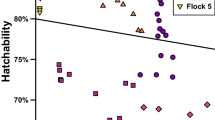Abstract
SEVERAL of the modern synthetic organic insecticides are showing promise for control of the external parasites of poultry. It is now well known that these insecticides exert influence on the health of animals in varying degrees. Pigeons exposed to high concentrations of phosgene and mustard gases showed a lower hæmoglobin content of blood1. Oral administration of DDT to certain laboratory animals resulted in anæmia and leucocytosis2. So far as we are aware, no information exists on the toxicological effects of these insecticides on the blood picture of poultry. The present communication outlines the results of our experiments with chicks.
This is a preview of subscription content, access via your institution
Access options
Subscribe to this journal
Receive 51 print issues and online access
$199.00 per year
only $3.90 per issue
Buy this article
- Purchase on Springer Link
- Instant access to full article PDF
Prices may be subject to local taxes which are calculated during checkout
Similar content being viewed by others
References
Luhers, G., Z. Veterinark., 48, 129 (1936).
Cameron, G. R., and Burgess, F., Brit. Med. J., i, 866 (1945).
Author information
Authors and Affiliations
Rights and permissions
About this article
Cite this article
SRIVASTAVA, B., SAXENA, H. & SHARMA, J. Influence of Dietary Intake of Certain Insecticides on the Hæmoglobin and Erythrocyte Contents of Chick Blood. Nature 186, 172–173 (1960). https://doi.org/10.1038/186172a0
Issue Date:
DOI: https://doi.org/10.1038/186172a0
This article is cited by
-
R�ckst�nde von Sch�dlingsbek�mpfungsmitteln auf Lebensmitteln und ihre gesundheitliche Bedeutung
Zeitschrift f�r Lebensmittel-Untersuchung und -Forschung (1964)
Comments
By submitting a comment you agree to abide by our Terms and Community Guidelines. If you find something abusive or that does not comply with our terms or guidelines please flag it as inappropriate.



